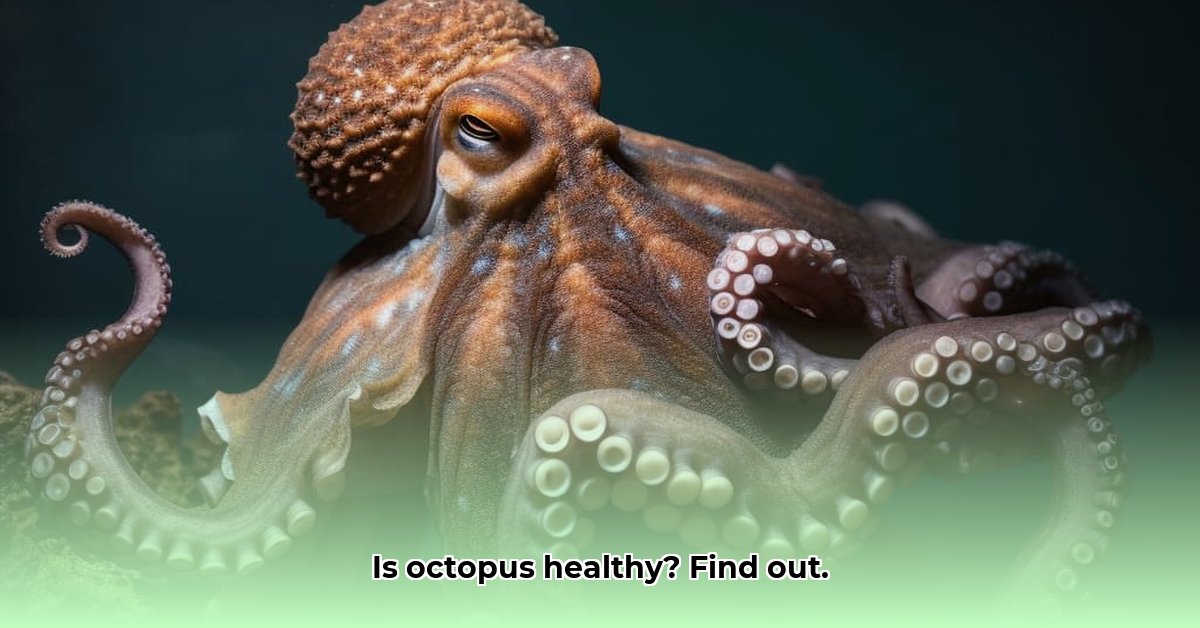Ever wondered if octopus is good for you? It’s a delicious seafood, but is it healthy? The truth is, it’s nuanced! This guide will help you understand the nutritional value, potential health benefits, risks, and ethical considerations surrounding octopus consumption. We’ll explore everything from heavy metal contamination to sustainable sourcing, empowering you to make informed choices about including this unique seafood in your diet. For a comprehensive guide, check out this helpful resource: Is Octopus Healthy?.
Diving Deep: Nutritional Benefits and Potential Risks
Is octopus a healthy addition to your diet? The answer is complex, as octopus offers both nutritional advantages and potential drawbacks. Let’s examine the complete picture, considering the nutritional profile, potential health benefits, risks, ethical considerations, and practical tips to help you make informed choices.
Unleashing the Nutritional Powerhouse: Vitamins, Minerals, and More
Octopus is a surprisingly nutritious seafood, and a fantastic source of lean protein, essential for building and repairing tissues. It’s also relatively low in fat and calories, making it a suitable choice for those mindful of their weight and fat intake. The real nutritional stars are the array of vitamins and minerals. Octopus is packed with vitamin B12, crucial for nerve function, DNA synthesis, and red blood cell production, boasting over 1,275% of the Daily Value (DV) in a 3-ounce serving.
It also provides a significant dose of selenium (139% of the DV), a powerful antioxidant that supports thyroid function and protects against cell damage. Other notable nutrients include copper (70% of the DV), vital for energy production and iron absorption, and iron (45% of the DV), essential for oxygen transport. It also contains zinc, niacin, phosphorus, choline, magnesium, and potassium. Note that the exact nutritional content can vary depending on the species, size, and origin of the octopus, as well as the cooking method employed.
Health Benefits: From Heart Health to Mood Enhancement
Studies suggest that octopus consumption may offer several health benefits. The omega-3 fatty acids present in octopus, including docosahexaenoic acid (DHA) and eicosapentaenoic acid (EPA), are considered heart-healthy nutrients. These may help reduce inflammation and protect against heart disease.
Research suggests a diet rich in omega-3s may lower the risk of some cancers, support cognitive function, and promote a healthy gut microbiome. The presence of magnesium may also support healthy brain activity, memory, and learning processes. Interestingly, studies show those who eat moderate amounts of seafood tend to score lower on measures of depression. Octopus contains nutrients like vitamin B12, selenium, iron, and zinc, ranking it among the top antidepressant foods analyzed in some studies.
It’s important to note that much of this research is ongoing, and more studies are needed to confirm these potential benefits conclusively.
Navigating the Risks: Heavy Metals, Sodium, and Allergies
While octopus provides nutritional benefits, potential drawbacks exist. One significant concern is heavy metal contamination, including mercury and arsenic, which can accumulate in the tissues. Larger, older octopuses are more likely to contain higher levels of these metals. The levels of contamination can also vary significantly depending on the location where the octopus is caught, with some areas having more polluted waters than others.
The sodium content in octopus is another crucial factor to consider. A single serving can contribute a significant portion of your daily recommended intake.
Finally, as with any shellfish, allergic reactions are a possibility. Shellfish allergies are among the most common food allergies, so individuals with known shellfish allergies should exercise extreme caution.
Ethical Considerations: Sustainability and Animal Welfare
Before incorporating octopus into your diet, considering the ethical and environmental impact of its consumption is essential. Overfishing poses a significant threat to octopus populations worldwide. The Food and Agriculture Organization of the United Nations (FAO) has highlighted concerns about the sustainability of certain octopus fisheries.
Many octopus species are highly intelligent, exhibiting complex behaviors and problem-solving abilities. Some individuals and organizations question the ethics of consuming such intelligent creatures.
Choosing sustainably sourced octopus is vital for protecting both the octopus population and the marine ecosystem. Look for certifications like the Marine Stewardship Council (MSC) label, where available, to ensure your choice supports responsible fishing practices.
Responsible Consumption: A Guide to Sustainable Choices
If you choose to include octopus in your diet, prioritize responsible and sustainable practices:
- Sustainable Sourcing: Prioritize octopus from reputable sources committed to sustainable fishing practices. Look for certifications like the Marine Stewardship Council (MSC) label.
- Careful Preparation: Thoroughly cook octopus to eliminate harmful bacteria. Grilling, steaming, poaching, or braising are healthier options than deep-frying.
- Mindful Portioning: Be mindful of the naturally high sodium content. Consume in moderation, especially if you are managing your sodium intake.
- Inspect for Freshness: When buying fresh octopus, look for firm, brightly colored flesh with a fresh, slightly sweet aroma. Avoid any octopus that smells fishy or has a slimy texture.
- Geographical Awareness: Be aware of the geographical origin of the octopus. Octopus from areas with known pollution issues may have higher levels of heavy metals.
Risk Mitigation: A Balanced Approach
Here’s a summary of potential risks and how to minimize them:
| Risk Factor | Likelihood | Severity | Mitigation |
|---|---|---|---|
| Heavy Metal Contamination | Moderate-High | High | Choose smaller, sustainably sourced octopus; limit consumption; be aware of geographical origin; remove digestive glands before cooking. |
| High Sodium Content | High | Moderate | Portion control; choose low-sodium cooking methods; be mindful of overall sodium intake. |
| Allergic Reactions | Low-Moderate | Medium | Be aware of allergies; start with small portions; have antihistamines readily available. |
| Unsustainable Fishing Practices | High | High | Choose MSC-certified octopus (where available) and support sustainable fisheries. |
Making Informed Choices: Balancing Health and Responsibility
Is octopus healthy to eat? As with most foods, the answer is nuanced. Octopus offers nutritional benefits, but potential risks exist. By making informed decisions about sourcing, preparation, and consumption, you can enjoy this seafood responsibly. Mindful food choices benefit your health and the health of our oceans.
Navigating the Seafood Aisle: How to Choose Sustainably Sourced Octopus and Minimize Heavy Metal Intake
Key Takeaways:
- Octopus is a source of protein, vitamins, and minerals, offering health benefits as part of a balanced diet.
- Heavy metal contamination, particularly mercury and lead, and unsustainable fishing practices are primary concerns.
- Responsible sourcing, proper preparation, and mindful consumption are essential for minimizing risks.
Decoding the Nutritional Value: Why Octopus Can Be a Smart Choice
Octopus is a nutritional powerhouse, boasting a high protein content, Omega-3 fatty acids, and essential vitamins like B12, iron, copper, selenium, zinc, magnesium, and potassium. These nutrients are crucial for various bodily functions, including energy production, immune support, and nerve function. The overall nutritional content can vary depending on the species, size, and origin.
Unveiling the Health Benefits: A Cardioprotective Seafood Choice
Studies suggest that regular consumption of seafood like octopus may contribute to improved cardiovascular health, reduced risk of certain cancers, and enhanced cognitive function. Omega-3 fatty acids can lower blood pressure and reduce the risk of heart disease. Taurine can help reduce blood pressure and cholesterol levels. Selenium, vitamin B12, and folate act as antioxidants and may reduce cancer risk. Magnesium can support healthy brain activity, memory, and learning processes.
However, these benefits depend on several factors, including sourcing and preparation methods.
Understanding the Risks: Heavy Metal Contamination and Sodium Levels
A major concern is heavy metal contamination, with mercury and lead being the primary culprits. These metals can accumulate in octopus tissues, particularly in those from polluted waters. Octopus is also naturally high in sodium, which is a concern for those monitoring their sodium intake. Allergic reactions are possible. The key thing is to ensure proper preparation.
Here’s how to choose sustainably sourced octopus and reduce heavy metal intake:
- Prioritize Sustainable Sourcing: Look for octopus certified by the Marine Stewardship Council (MSC) 1. The MSC label indicates that it comes from a fishery meeting strict environmental standards. The Monterey Bay Aquarium Seafood Watch program is also a reliable resource.
- Select Reputable Suppliers: Buy octopus from trusted fishmongers and retailers committed to sustainability. Don’t hesitate to ask questions about the source and fishing methods.
- Proper Preparation is Key: Thoroughly cook octopus to eliminate harmful bacteria. Remove the digestive glands (ink sacs) before cooking, as these tend to concentrate heavy metals.
- Portion Control and Moderation: Consume octopus in moderation due to its natural sodium content and potential heavy metal accumulation.
- Stay Informed: Educate yourself on sustainable seafood choices and support organizations working to protect octopus populations.
Risk Mitigation:
| Risk Category | Probability | Severity | Mitigation Strategies |
|---|---|---|---|
| Heavy Metal Contamination | Low to Medium | High | Choose sustainably sourced octopus; avoid consumption of digestive glands; limit intake; consider the geographic origin. |
| High Sodium Content | High | Moderate | Consume in moderation; be mindful of overall sodium intake. |
| Unsustainable Fishing Practices | High | High | Choose MSC-certified octopus, support sustainable fisheries, and be an informed consumer. |
Examining Sustainable Octopus Farming Techniques and Ethical Considerations
Key Takeaways:
- Octopuses are intelligent creatures; farming practices raise ethical concerns.
- Current octopus farming methods are unsustainable and resource-intensive.
- The environmental impact of octopus farming remains a considerable concern.
The Nutritional Profile of Octopus
Octopus is a good source of lean protein, providing essential amino acids. It also contains vitamins and minerals, including vitamin B12, selenium, and iron. Its sodium content is high, a factor for those monitoring their salt intake. Nutrient levels are affected by diet and environment.
The Questionable Health Benefits of Octopus Consumption
Including octopus in your diet could contribute to heart health, thanks to its omega-3 fatty acids, and potential improvements in cognitive function, with some studies suggesting a positive role in mood regulation. This is not conclusive, and much more comprehensive research is required.
The Potential Risks and Concerns
There is a significant risk of heavy metal contamination, especially in octopus from polluted waters. The high sodium content is a further concern, potentially impacting blood pressure. Allergies to shellfish are a real possibility, making octopus a potential allergen. Responsible sourcing is critical to mitigating these risks.
The Environmental and Ethical Implications of Octopus Farming
Sustainable Octopus Farming Techniques and Ethical Considerations lie at the heart of the sustainability conversation. The high intelligence of octopuses raises ethical questions about their welfare in confined environments. Current farming methods are resource-intensive, requiring large quantities of fishmeal and fish oil. This creates further environmental strain. Unsustainable techniques contribute to overfishing and habitat destruction, and escapes from farms and the spread of diseases can threaten wild populations.
The Way Forward: Consumers’ Responsibilities
- Choose Sustainably Sourced Octopus: Look for certifications from reputable organizations that prioritize environmental protection and ethical treatment.
- Follow Reliable Recipes and Cooking Instructions: Prepare octopus correctly. Improper cooking can lead to tough, rubbery meat, while proper cooking enhances flavor.
- Be Mindful of High Sodium Content: Monitor your sodium intake. Be aware of high sodium content, especially if you have high blood pressure. Consider culinary methods that minimize the salt needed.
- Stay Informed: Read about the ethical and environmental impact of octopus farming and fishing.
Octopus Preparation Methods for Minimizing Heavy Metal Exposure
A Deep Dive into Safe and Responsible Consumption
Key Takeaways:
- Octopus is a lean protein source packed with vitamins and minerals.
- Heavy metal contamination, especially lead and mercury, is a primary risk that can vary with geographic location.
- Sustainable sourcing and proper cooking are essential for minimizing risks.
- Ethical considerations regarding octopus sentience and sustainable fishing practices are things to consider.
- Making informed decisions is key to enjoying octopus safely and responsibly.
The Nutritional Powerhouse: Vitamins and Minerals Abound
Octopus is a lean source of protein. It is also packed with Omega-3 fatty acids and Vitamins such as B12, selenium, iron, and other beneficial nutrients. These support heart health, brain function, and a strong immune system.
Potential Health Benefits: More Than Just Flavor
Studies suggest that the array of nutrients found in octopus may offer several health advantages. Omega-3s are known for their heart-healthy properties, and the vitamins and minerals can contribute to cognitive function and overall well-being.
Potential Risks: Heavy Metals in Octopus
Heavy metal contamination is a concern. Studies have shown elevated lead levels in octopus from certain regions, a serious risk, especially for pregnant women and young children. Mercury is another potential worry. Octopus is also high in sodium, which can be a challenge for those with high blood pressure.
Ethical and Environmental Concerns: Intelligent Creatures in Peril
The intelligence of octopuses fuels ethical questions. Should we eat such complex, intelligent creatures? Sustainability issues also demand our attention, given that overfishing threatens octopus populations.
A Consumer’s Guide to Safe and Ethical Octopus Consumption
Here’s a framework for making informed choices about enjoying octopus responsibly:
- Source Carefully: Choose smaller octopus from suppliers committed to sustainable fishing practices. Look for certifications that guarantee responsible sourcing.
- Choose Wise Octopus Preparation Methods for Minimizing Heavy Metal Exposure: Thorough cooking is vital, aiming for an internal temperature of 145°F (63°C) to kill harmful bacteria and potentially reduce the bioavailability of certain heavy metals.
- Practice Portion Control: Limit your octopus consumption, especially if you live in an area with high heavy metal levels in seafood.
- Preparation Techniques: Select preparation methods that minimize water use and discard cooking liquid to reduce the concentration of any heavy metals present.
5 Choose sustainable fishing.
Making informed choices about sourcing, preparation, and consumption is key.
- Stainless Steel Food Storage for Healthier, Eco-Friendly Meal Prep - February 27, 2026
- Stainless Food Containers Offer Durable Storage for Everyday Meals - February 26, 2026
- Stainless Steel Containers Offer Superior Food Preservation and Durability - February 25, 2026










